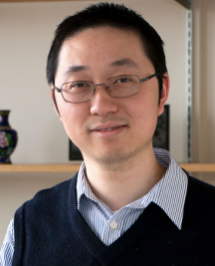
Juejun (JJ) Hu
Associate Professor of Materials Science and Engineering
Research
Professor Hu's research group's main research theme focuses on novel materials and devices to exploit interactions of light with matter. Their work covers a wide spectrum of applications including:
- On-chip sensing and spectroscopy: capitalizing on a digital Fourier-Transform (dFT) technology the group invented, they have created miniaturized and rugged sensors that can be mass produced using standard CMOS manufacturing technologies for industrial process control, medical imaging, and space applications.
- Optical phase change materials and meta-optics: optical phase change materials are a class of materials whose optical properties are drastically modified upon undergoing a solid-state phase transition. Using these intriguing materials, the group has pioneered a series of cutting-edge reconfigurable optical devices that can be re-programmed to adapt to specific tasks.
- 2-D material photonic integration: 2-D materials offer many tantalizing properties that conventional optical materials do not possess. However, integration of these materials onto an integrated photonics platform can be challenging. The Hu group addresses the challenge by developing new monolithic integration schemes on 2-D materials, enabling novel photonic devices with unprecedented performance.
- Flexible photonics and polymer photonics: traditionally, photonic circuits are fabricated on rigid substrates such as semiconductors or glasses. The group has developed novel methods to make photonic devices flexible, stretchable, and rugged without compromising their optical performance. They are exploring emerging applications of such devices in biomedical monitoring and high-speed data communications.
- Optics for solar energy: the Hu group has demonstrated novel optical architectures and module integration technologies that can effectively boost the efficiency of photovoltaic modules while maintaining a footprint and cost comparable to standard silicon flat panels.
- Magneto-optical isolation: they are developing chip-scale one-way valves for photons that will become an integral part of next-generation optical communication and navigation systems.
Biography
Juejun (JJ) Hu received his B.S. degree from Tsinghua University, China, in 2004, and his Ph.D. degree from Massachusetts Institute of Technology, Cambridge, MA, USA, in 2009, both in materials science and engineering. He is currently the Merton C. Flemings Career Development Associate Professor in MIT’s Department of Materials Science and Engineering. His primary research interest is enhanced photon-matter interactions in nanophotonic structures. Prior to joining MIT, he was an Assistant Professor at the University of Delaware from 2010 to 2014. Hu has authored and co-authored more than 70 refereed journal publications since 2006 and has been awarded six U.S. patents. He has been recognized with the National Science Foundation Faculty Early Career Development award, the Robert L. Coble Award from the American Ceramic Society, the Gerard J. Mangone Young Scholars Award, the University of Delaware College of Engineering Outstanding Junior Faculty Member, the University of Delaware Excellence in Teaching Award, among others.
Contact
Email: hujuejun@mit.edu
Phone: 302-766-3083
13-4054
Website: http://web.mit.edu/hujuejun/www/
LinkedIn: https://www.linkedin.com/in/jj-hu-253b816/
Administrative Assistant:
Sandra Crawford
Email: crawfjen@mit.edu
Phone: 617-253-0495
13-5110




